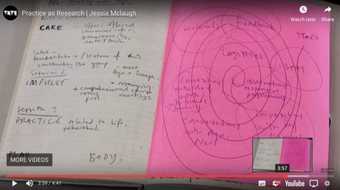Goldsmiths, University of London
Supervised by Professor Kristen Kreider, Head of Fine Art Research, Goldsmiths; Dr Michelle Williams Gamaker, Lecturer in Fine Art, Goldsmiths; and Mark Miller, Head of Programme and Practice, Learning and Research, Tate
October 2018 –

Screenshot of a Tate video titled Practice as Research playing on YouTubePhoto courtesy Jessie McLaughlin
My thesis by practice considers the ways in which genuinely radical programming in the art museum might be realised, specifically through working with and listening to young and diverse audiences to transform the art museum into an ‘artistically adventurous and culturally inclusive’ civic space which actively promotes access and diversity of perspectives. As the demographic of audiences change – London’s white British population is no longer the city’s most dominant group and young people are increasingly identifying as something other than heterosexual and cisgendered (to identify with the gender one is assigned at birth) – how can we work with audiences to inform a new vision?
Using three interlocking elements – art museum learning programmes and the staff who curate and create them, collection artworks and texts by queer theorists and writers – this project explores how cultural institutions can remain relevant, radical and sustainable in the 21st century and beyond.
How did you come to be researching this subject with Tate?
As former Assistant Curator and then Curator in the Tate Learning department, I had been thinking about how audiences experience Tate, specifically young people and those engaging with Learning programme since I began working here. After 3 years as part of Tate Learning, I applied for a CDP opportunity to explore the practical, artistic and political questions around access and inclusivity in art museums for young audiences. I enjoy exploring the complexities of how we work, live and engage with one another and I want to work for the empowerment of people and especially young people. This Tate CPD PhD enables me to spend time researching what it really means to create accessible and inclusive public space to look at and engage with art.
About Jessie McLaughlin
Jessie McLaughlin is an amateur artist. they work from a queer, brown (sometimes sad) perspective, foregrounding emotional experiences and proposing these as valid methods of research. They enjoy dancing, boxing and kick-ups in the park.
